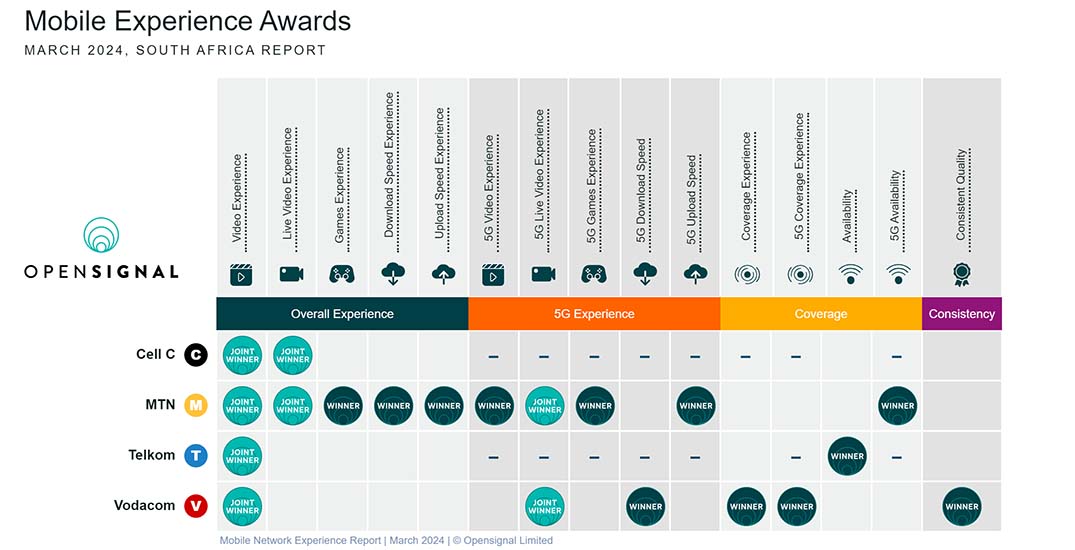MTN’s South African customers enjoy the fastest mobile experience, with speeds well ahead of competitive network provoders.
This is one of the findings from Opensignal research analysing and understanding the true experience consumers receive on wireless networks.
In Opensignal’s latest analysis of the mobile network experience in South Africa, MTN continues to take home the largest haul of awards, winning seven out of 15 categories outright and sharing a further three awards with its rivals due to statistical ties.
Meanwhile, Vodacom wins the second largest share, leading solely in four categories including overall and 5G Coverage experience, and jointly wins in a further two.
Telkom is the only other South African operator to achieve an outright win, with leading scores in Availability.

MTN comes in tops for both Download and Upload Speed Experience, with users seeing average download speeds of 47Mbps – almost 50% faster than runner-up Vodacom. Compared to the the last report, MTN users have seen the biggest improvement in absolute terms.
Vodacom users have seen the fastest average 5G download speeds in South Africa, at 195,9Mbps. On the other hand, MTN holds on to the 5G Upload Speed award.
Vodacom came out top for Consistent Quality, with 62,7% of tests meeting the minimum thresholds to support more demanding commonly-used mobile applications, such as video calling or uploading an image to social media.
However, MTN comes close to challenging Vodafone’s top spot due to a significant improvement of 7.7 points compared to the last report. Cell C users have observed the largest improvement since the last report.
When playing multiplayer mobile games over cellular connections, MTN users now have the best experience, both overall and when connected to 5G. MTN wins both the Games Experience and 5G Games Experience awards outright — a change from the last report, when all four operators shared the Games Experience award due to a statistical tie.
Moving away from 2G and 3G
The Department of Communications and Digital Transformation (DCDT) has extended the 2G and 3G sunset deadline to December 2027. By freeing up this spectrum, the DCDT aims to facilitate the expansion of faster and more efficient 4G and 5G technologies.
The country’s major operators are trying to prepare their customers for the migration by running initiatives such as offering upgrade incentives and educational campaigns.
However, Opensignal’s recent analysis shows that smartphone users in South Africa still spend a significant amount of time connected to older network generations, like 3G, or even 2G, which means the South African government and the operators face challenges with switching off legacy networks.
As the country strives to sunset 2G and 3G, ensuring these users have access to affordable 4G or 5G alternatives will be crucial to bridging the digital divide and driving positive social and economic outcomes.
Opensignal examined the mobile network experience of the four main mobile network operators in South Africa — Telkom, Cell C, MTN and Vodacom — over a period of 90 days starting on 1 November 2023 and ending on 29 January 2024, to see how they fared.
Vodacom wins the Consistent Quality award outright with a score of 62,7%, while MTN places in second with a slightly lower 62,3%. Cell C and Telkom follow behind with scores of 53,4% and 50,6%, respectively.
Since the the last report, Cell C’s score has increased by a notable 10 percentage points followed by the increases of eight percentage points seen on both Telkom and MTN. Comparatively, Vodacom’s score has risen by two percentage points.
This metric measures if the network is sufficient to support common mobile application requirements at a level that is ‘good enough’ for users to maintain (or complete) various typical demanding tasks on their devices. It assesses a number of experience indicators such as download speed, upload speed, latency, jitter, packet loss, and time to first byte.
